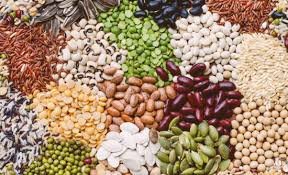healthiest seeds Consumption and Its Remarkable Benefits
healthiest seeds, often overlooked in the realm of nutrition, are tiny powerhouses packed with a plethora of essential nutrients, healthy fats, and plant compounds. From chia and flaxseeds to sunflower and pumpkin seeds, these small but mighty wonders offer a myriad of health benefits that can contribute significantly to overall well-being. In this comprehensive guide, we delve into the world of healthy seed consumption, exploring their nutritional profiles, diverse culinary uses, and the remarkable benefits they offer for human health.
Understanding the Nutritional Value of Seeds: Seeds are rich reservoirs of essential nutrients, including vitamins, minerals, protein, and dietary fiber. While the nutrient composition varies among different types of seeds, they generally contain a blend of macronutrients and micronutrients crucial for optimal health.
- Macronutrients:
- Protein: Seeds are excellent sources of plant-based protein, making them a valuable addition to vegetarian and vegan diets. Protein is essential for muscle repair and growth, immune function, and hormone production.
- Healthy Fats: Many seeds are abundant in healthy fats, particularly omega-3 fatty acids and monounsaturated fats. These fats support heart health, brain function, and reduce inflammation in the body.
- Carbohydrates: Seeds contain carbohydrates in the form of dietary fiber, which aids digestion, promotes satiety, and helps regulate blood sugar levels.
- Micronutrients:
- Vitamins: Seeds are rich in various vitamins, including vitamin E, vitamin B complex (such as thiamine, riboflavin, niacin, and folate), and vitamin K. These vitamins play essential roles in energy metabolism, immune function, and cell repair.
- Minerals: Seeds are abundant sources of minerals like magnesium, zinc, iron, and calcium, which are crucial for bone health, muscle function, and overall vitality.
Health Benefits of Seeds: Incorporating seeds into your diet can yield an array of health benefits, ranging from improved heart health to enhanced cognitive function. Here are some notable advantages of consuming seeds regularly:
- Heart Health: The omega-3 fatty acids found in seeds, such as flaxseeds, chia seeds, and hemp seeds, have been linked to reduced risk factors for cardiovascular disease, including lower cholesterol levels and improved blood pressure regulation.
- Weight Management: Despite their small size, seeds are remarkably filling due to their high fiber and protein content. Including seeds in meals or snacks can promote satiety, helping to curb overeating and support weight management efforts.
- Blood Sugar Control: The soluble fiber present in seeds, such as psyllium husk and flaxseeds, slows down the absorption of sugars in the bloodstream, thereby aiding in blood sugar regulation. This can be particularly beneficial for individuals with diabetes or those at risk of developing the condition.
- Digestive Health: Seeds are a rich source of dietary fiber, which promotes digestive regularity, prevents constipation, and supports a healthy gut microbiome. Consuming fiber-rich seeds like chia seeds and pumpkin seeds can alleviate digestive issues and promote overall gut health.
- Brain Function: Omega-3 fatty acids, particularly docosahexaenoic acid (DHA), found in seeds like flaxseeds and walnuts, are essential for brain health and cognitive function. Regular consumption of these seeds may help improve memory, concentration, and mood.
- Antioxidant Protection: Many seeds contain potent antioxidants, such as vitamin E, selenium, and phytochemicals, which help neutralize harmful free radicals and protect cells from oxidative damage. This antioxidant activity may lower the risk of chronic diseases, including cancer and aging-related conditions.
Incorporating Seeds into Your Diet: Adding seeds to your daily diet is simple and versatile, as they can be enjoyed in various forms and culinary applications. Here are some creative ways to incorporate seeds into your meals and snacks:
- Sprinkle seeds over salads, soups, yogurt, or oatmeal for an added crunch and nutritional boost.
- Blend seeds into smoothies or shakes for a nutrient-packed beverage.
- Use seeds as a topping for homemade granola, cereal, or baked goods like muffins and bread.
- Make homemade seed butter by blending roasted seeds until smooth, then spread it on toast or use it as a dip for fruits and vegetables.
- Incorporate ground seeds into recipes for pancakes, waffles, or energy bars to increase their nutritional value.
Conclusion: healthiest seeds are nutritional powerhouses that offer a multitude of health benefits when incorporated into a balanced diet. From supporting heart health and weight management to promoting digestive wellness and cognitive function, these tiny yet mighty superfoods deserve a prominent place in your daily nutrition regimen. By harnessing the power of healthiest seeds and exploring the diverse ways to enjoy them, you can enhance your overall well-being and embark on a journey towards optimal health and vitality.
Thanks for visiting Gymbag4u.com
You may also love reading our following articles. gymbag4u.com/sabja-seeds-a-superfood-with-many-benefits/ and Usage and Benefits of Basil Seeds – GymBag4U and The Benefits of Pumpkin Seeds – GymBag4U and Flax seed consumption health benefits and side effects – (gymbag4u.com) and Sweet Potato Delights: Exploring Nutrition Facts and Iconic Recipes – GymBag4U
